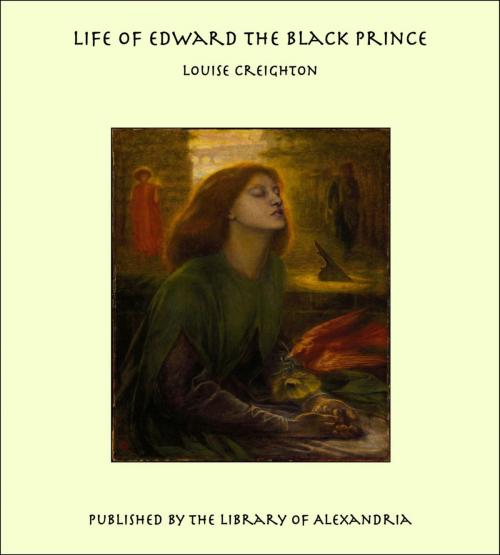Life of Edward the Black Prince
Nonfiction, Religion & Spirituality, New Age, History, Fiction & Literature| Author: | Louise Creighton | ISBN: | 9781465552228 |
| Publisher: | Library of Alexandria | Publication: | March 8, 2015 |
| Imprint: | Language: | English |
| Author: | Louise Creighton |
| ISBN: | 9781465552228 |
| Publisher: | Library of Alexandria |
| Publication: | March 8, 2015 |
| Imprint: | |
| Language: | English |
Early Years of the Black Prince. On the 15th June, in the year 1330, there were great rejoicings in the Royal Palace of Woodstock. One Thomas Prior came hastening to the young King Edward III. to tell him that his Queen had just given birth to a son. The King in his joy granted the bearer of this good news an annual pension of forty marks. We can well imagine how he hurried to see his child. When he found him in the arms of his nurse, Joan of Oxford, overjoyed at the sight, he gave the good woman a pension of ten pounds a year, and granted the same sum to Matilda Plumtree, the rocker of the Prince's cradle. Perhaps with Edward's thoughts of joy at the birth of his son were mingled some feelings of shame. It was three years since he had been crowned, and yet he was King only in name. He was nothing but a tool in the hands of his unscrupulous mother Isabella, and her ambitious favourite Mortimer. He was very young, not quite eighteen, and had not had sufficient knowledge or experience to know how to break the bonds within which he was held. But with the new dignity of father came to him a sense of his humiliating position. He would wish that his own son, on reviewing his youth, should have different thoughts of his father than he had. He can hardly have borne to look back upon his own youth, with its shameful memories. He had seen his father, Edward II., by his dissipated life and his slavish devotion to his favourites, alienate the affection of his subjects, and provoke the Barons to rise against him. Then, when peace had for awhile been restored, he had gone with his mother to France. He had seen her refuse to return to England at the King's demand; he had watched the growth of the disgraceful intimacy between her and Roger Mortimer, one of the rebel earls. At last, a powerless instrument in their hands, he had been taken by her and Mortimer to invade England, and Edward II.'s throne was attacked and overthrown by his own wife and son. The rebellion was entirely successful. None were found to espouse the cause of the despised King. He was obliged formally to give up the crown to his son, and on the 20th January, 1327, Edward III., then only in his fourteenth year, was proclaimed King. All we know of the part taken by Edward III. himself in these proceedings is, that he refused to receive the crown without the sanction of his father. But he had no real power: all was in the hands of the Queen and Mortimer. Before the end of the year, feeling insecure whilst Edward II. was still alive, they caused him to be secretly murdered in the castle where he was imprisoned. Soon after they married the young King to Philippa, daughter of the Count of Hainault, a union destined in every way to contribute to his happiness and to the good of the kingdom
Early Years of the Black Prince. On the 15th June, in the year 1330, there were great rejoicings in the Royal Palace of Woodstock. One Thomas Prior came hastening to the young King Edward III. to tell him that his Queen had just given birth to a son. The King in his joy granted the bearer of this good news an annual pension of forty marks. We can well imagine how he hurried to see his child. When he found him in the arms of his nurse, Joan of Oxford, overjoyed at the sight, he gave the good woman a pension of ten pounds a year, and granted the same sum to Matilda Plumtree, the rocker of the Prince's cradle. Perhaps with Edward's thoughts of joy at the birth of his son were mingled some feelings of shame. It was three years since he had been crowned, and yet he was King only in name. He was nothing but a tool in the hands of his unscrupulous mother Isabella, and her ambitious favourite Mortimer. He was very young, not quite eighteen, and had not had sufficient knowledge or experience to know how to break the bonds within which he was held. But with the new dignity of father came to him a sense of his humiliating position. He would wish that his own son, on reviewing his youth, should have different thoughts of his father than he had. He can hardly have borne to look back upon his own youth, with its shameful memories. He had seen his father, Edward II., by his dissipated life and his slavish devotion to his favourites, alienate the affection of his subjects, and provoke the Barons to rise against him. Then, when peace had for awhile been restored, he had gone with his mother to France. He had seen her refuse to return to England at the King's demand; he had watched the growth of the disgraceful intimacy between her and Roger Mortimer, one of the rebel earls. At last, a powerless instrument in their hands, he had been taken by her and Mortimer to invade England, and Edward II.'s throne was attacked and overthrown by his own wife and son. The rebellion was entirely successful. None were found to espouse the cause of the despised King. He was obliged formally to give up the crown to his son, and on the 20th January, 1327, Edward III., then only in his fourteenth year, was proclaimed King. All we know of the part taken by Edward III. himself in these proceedings is, that he refused to receive the crown without the sanction of his father. But he had no real power: all was in the hands of the Queen and Mortimer. Before the end of the year, feeling insecure whilst Edward II. was still alive, they caused him to be secretly murdered in the castle where he was imprisoned. Soon after they married the young King to Philippa, daughter of the Count of Hainault, a union destined in every way to contribute to his happiness and to the good of the kingdom















